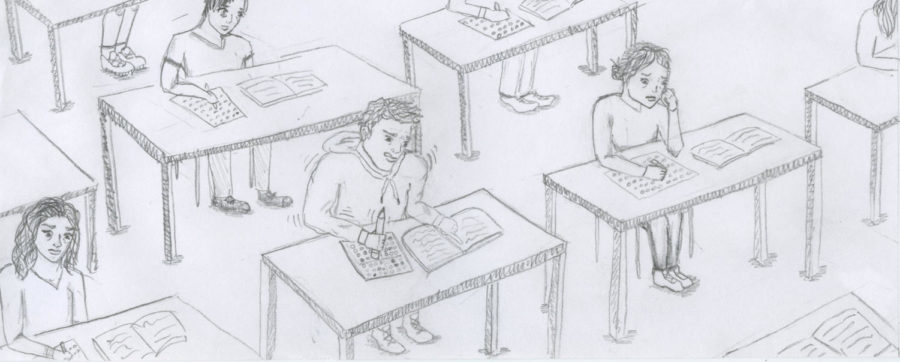Test anxiety proves prominent at South
December 22, 2017
Junior Lily Dolan sits down to take her next round of ACT tests, hoping to score a few points higher than last time in order to receive a scholarship from her dream college that she knows her family wouldn’t be able to pay for on their own. Suddenly, she feels as though she is staring down at her entire future, knowing that the next few answers she bubbles in will determine the next course of her life.
Standardized test anxiety is a prevalent problem at South according to a non scientific survey conducted by The Oracle. This survey found that 70 percent of students are affected by testing anxiety.
Among these students is Dolan, who claims she experiences anxiety because of the importance of test scores for college applications.
“There’s a lot of pressure from [standardized testing] because it determines your whole future, like where you go to college, especially because I am aiming for a scholarship,” Dolan said.
Dolan believes her worst problem while taking a standardized test is ruminating on one question and thinking about it for too long. Next time she takes the ACT, she says she is aiming to work more efficiently and to try not to second guess herself.
“‘Do it, just go and do it,’” Dolan tells herself. “I cannot keep looking at a problem and thinking about it and stressing about if I’m getting it right, I just have to move on and trust my instincts.”
Sophomore Kevin Meier says he has also struggled with a form of undiagnosed test anxiety. He believes a lot of students experience anxiety over tests because of their desire to achieve high grades that look good on their transcripts.
“Everyone wants to do well on the test, but obviously it’s hard because tests are meant to challenge you,” Meier said. “[Students] really want to do a good job so they can get into the colleges they want and get the grades they want. So they get anxiety over if they’re going to do well or not.”
Meier says he would tell anyone with test anxiety that many other students feel the same way. He says a person with test anxiety will realize later in life that there are more important things in life than worrying about a test.
“I would say I wish they didn’t have it because it matters, but it isn’t something that is going to totally ruin you,” Meier said. “In the long run it really doesn’t matter that much.”
South psychologist Dr. Kimberly Larsen believes standardized test anxiety is more common currently with South students than in years past because of an increased amount of pressure put on kids of this generation.
“I think especially where we live there is so much pressure put on kids especially about post high school goals,” Larson said. “From a very young age, it adds to the pressure that you might feel in general with a test.”
According to Larsen, every student’s experience with test anxiety is very different from the next. Some students may encounter a difficulty in concentrating, sweaty palms, racing heart, or rapid breathing while actually taking a test. Larsen says when students seek help from a counselor or psychologist, they will usually talk about how to cope with their anxiety on a more long-term basis.
“We’ll talk about trying to change what we call mindset, like not evaluating yourself on one score, not evaluating yourself on one test,” Larsen said. “I can talk all day about why you shouldn’t worry about a test as much, but that doesn’t help you to calm down as you’re walking into that test.”
Larsen says any student with a standardized test anxiety diagnosis is likely to have some other form of an anxiety diagnosis.
“I think [types of anxiety are] similarly paired,” Larsen said. “You have experiences, there’s certain expectations, and then you go into the next experience with trepidation and not necessarily the coping that you should because you’ve got all these high expectations for yourself.”
Larsen wants students with anxiety to know there is a light at the end of the tunnel.
“In the long run, [standardized test anxiety is] manageable,” Larsen said. “This is something you can overcome.”












